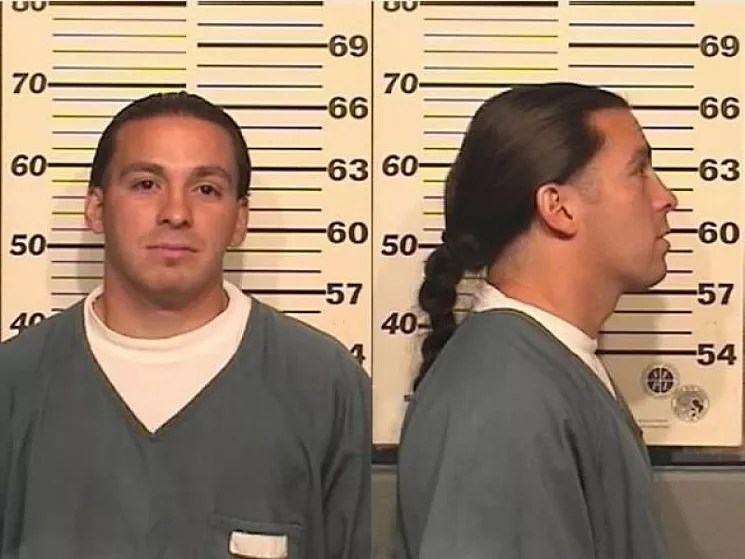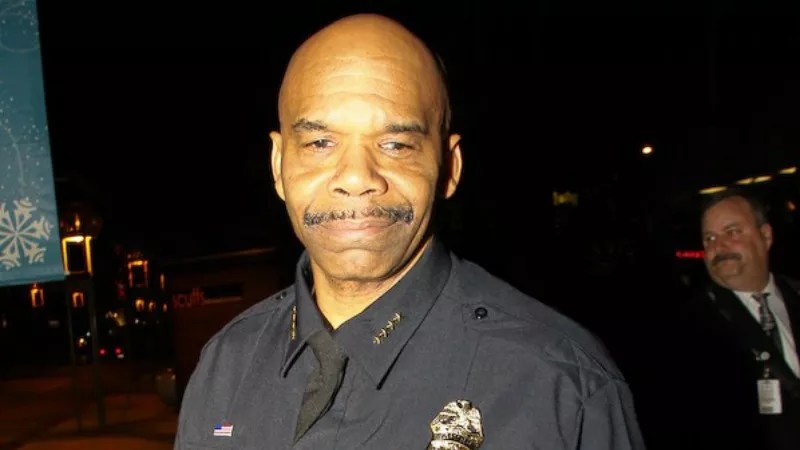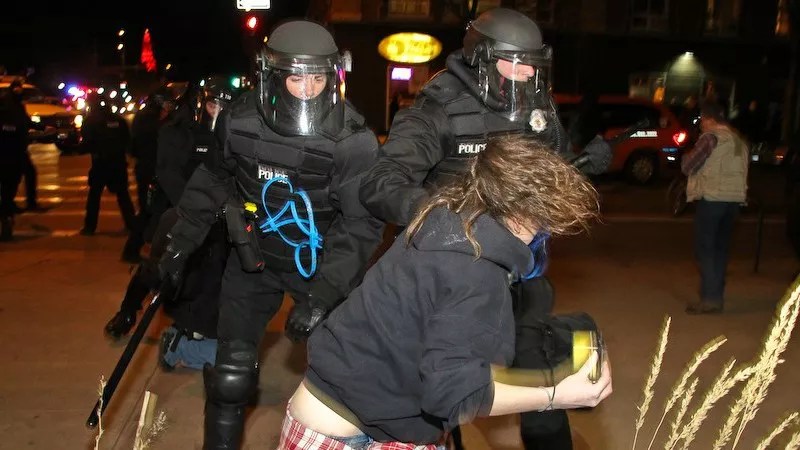
Photo by Brandon Marshall

Audio By Carbonatix
The Denver Police Department has expanded its body-worn-camera program to include members of the SWAT team. However, the policy’s fine print reveals that the cameras won’t be routinely used during tactical operations, when SWAT officers may be put in the position of using force. The man in charge of the DPD’s body-worn camera program justifies this exception by saying that criminals could use such footage to their advantage.
“For security reasons, we want to keep those tactics confidential,” Commander James Henning says. “We don’t want to give away all of our secrets.”
The department’s BWC pilot program was launched in 2014, and from the beginning, some personnel were excluded from participation, despite encouragement from the Office of the Independent Monitor, which oversees DPD activities, to use the devices as widely as possible. In September 2015, for example, the department announced that off-duty officers wouldn’t be required to wear BWCs before caving under public pressure a couple of weeks later. The following month, the DPD announced that sergeants would also be outfitted with cameras after previously opposing their inclusion in the program, too.
Nonetheless, Denver police officials held fast when it came to blocking SWAT usage of body-worn cameras, despite recommendations from Independent Monitor Nicholas Mitchell that the department “assign BWCs to all uniformed officers who interact with the public, regardless of rank, and whether they are working on- or off-duty, including officers in specialized units such as Metro/SWAT.” One reason for this argument: Of ten Denver officers involved in shootings circa 2014, two of them, or 20 percent, were assigned to SWAT.
We highlighted this issue in the December 2015 post “Why SWAT Cop John Ruddy Wouldn’t Have Had Body Cam in Phillip Munoz Shooting.”

A mug shot of Phillip Munoz, who was killed in an officer-involved shooting that wounded a member of Denver SWAT.
File photo
On December 2 of that year, as we reported, Denver officers were assisting colleagues in Thornton, where an assault warrant had originated. They attempted to stop a suspect later identified as Munoz near the intersection of West 26th Avenue and Newton Street. But Munoz – clad in a Denver sheriff’s department T-shirt – drove away.
He didn’t get far. His attempt to maneuver between a couple of homes near West 25th Avenue and Meade Street was short-circuited by the presence of a gas meter, which exploded when it was struck by Munoz’s ride.
Afterward, Munoz is said to have abandoned the car and started to run. Shots followed from both sides, and Ruddy and Munoz were struck. The SWAT officer survived, while Munoz was killed – but neither of the shootings were captured on video because of the aforementioned DPD policy.
Cut to June 30 of this year, when the Denver Police announced that all off-duty officers would be equipped with body-worn cameras starting the next day in the second major phase of the department’s BWC program implementation. And the same release noted that “officers in the Metro/SWAT section” would be required to wear cameras as well.
On the surface, this last development seems like a major policy shift – but the language pertaining to it in the Denver Police Department’s official operations manual reveals limitations. “Officers assigned to Metro/SWAT perform both patrol and tactical duties,” the section states. “When performing the duties of a patrol officer, Metro/SWAT personnel will utilize the BWC system in accordance with the policies and procedures.” But, the passage adds that “typically, when executing planned tactical operations, Metro/SWAT personnel will not utilize/deploy the BWC system. A commander or above may order the utilization of the BWC system during any operation.”

Denver Police Chief Robert White, with DPD deputy chief Matt Murray in the background, at the February 2012 “F*ck the Police” rally.
Photo by Brandon Marshall
When asked about phase two of the body-worn-camera program, Commander Henning declines to say why Denver Police Chief Robert White balked at ordering that officers working off-duty assignments and members of SWAT wear the devices from the beginning, or even to confirm that he initially felt that way. “I won’t answer for the chief on whether he was reluctant or not,” Henning says.
As for why it’s taken so long for off-duty officers to be assigned BWCs, Henning outlines the complications that needed to be overcome. “We provide camera docks at the district stations for all officers who carry them,” he says. “They put the cameras in the docks when they’re off, and the video uploads when they’re gone – and then they put them back on the next day. But cameras have limitations for battery life, and you have to have a mechanism to charge them – and we wanted officers to be able to upload their video as soon as practicable after their off-duty job. We couldn’t wait three or four days, or wait until after an officer got back from vacation. So we had to figure out how to do it more quickly – so as a convenience, the chief wanted to purchase home docks for each of the officers. That way, they can take the camera home and upload it from there. The hardware goes directly into their router, so we can get the video right away.”
In regard to SWAT, Henning explains that officers assigned to that unit also perform patrol duties. “They don’t wear their full SWAT regalia all the time,” he stresses. “If they go to an incident, they suit up and get on all of their gear. But they also have an olive drab uniform they use to perform other functions. They go out and make contacts and traffic stops and assist on covering other calls, and that’s when we want them to have cameras and utilize them.” Likewise, “when there’s a quickly evolving operation – if it’s an active shooter and they’re going in with another group of officers and it’s an unplanned operation – they’ll also utilize the cameras.”
If, on the other hand, “it’s a planned operation and they’re using special tactics, there are security issues,” Henning maintains. “The one way you’re successful in these tactical operations is if you’re able to execute your plan quickly and safely – and if people know everything that’s going to happen, it’s much easier for them to thwart that. And then the potential for it to go bad is much worse.”

Another photo from our February 2012 “F*ck the Police” rally slideshow.
Photo by Brandon Marshall
Whether criminals could actually study body-camera footage and find tactical weaknesses in anticipation of a standoff with SWAT is an open question that Henning deflects. But he does offer his views about the limitations of BWCs.
“People have this misconception that if we hang a camera on every cop and see everything they’re doing, it will solve all our problems,” he says. “But it really doesn’t. It’s another tool, It gives insight, and sometimes it explains things you wouldn’t normally get. But it’s just one more indication of what happened in a situation. You have to look at it along with statements the officers give, statements of witnesses, audio recordings, the entire package. It doesn’t provide all the answers.”
Henning sees Denver police’s use of body cameras as generally positive. “Obviously, cops are very cautious about change,” he acknowledges. “But they’ve been fairly well received, and there have been numerous internal affairs investigations that have cleared officers because of the video and the audio,” as well as capturing less flattering officer behavior – like, for instance, the actions of ex-Denver cop Julian Archuleta, who was caught on his own body camera taking money from the scene of a car crash.
Even so, Henning points out, “We’re in the infancy right now for body cameras. We’re putting this policy together, figuring out all the issues, all the little surprises, all the unexpected things.”
And for now, the department continues to believe that many of its SWAT tactics should be kept under wraps.